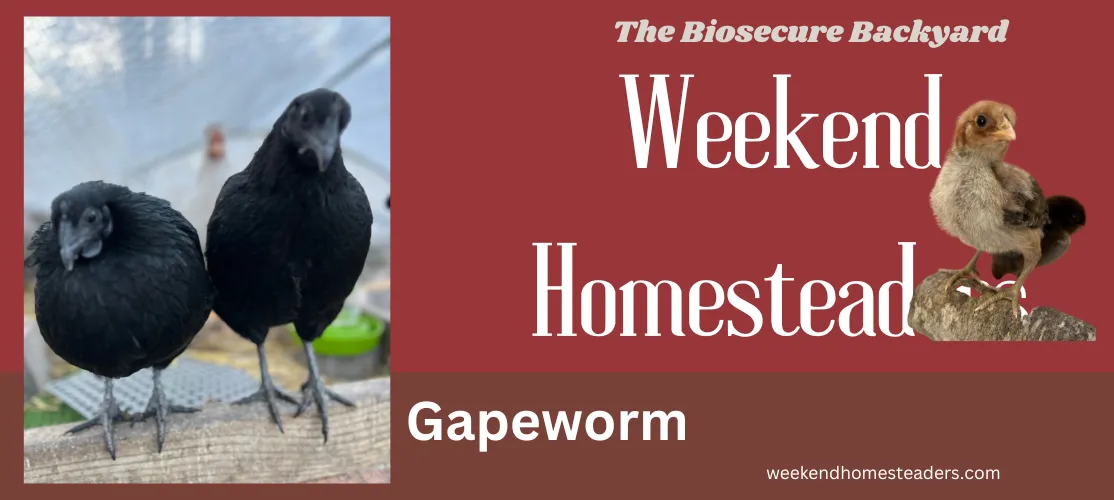
Understanding Gapeworm in Chickens: Prevention and Protection
Gapeworms (Syngamus trachea) can infect chickens even if you’ve never had chickens on your property before because the parasite's life cycle does not begin exclusively within chickens. The gapeworm has a complex life cycle that involves various hosts, not just chickens.
How Gapeworms Enter the Soil:
Wild Birds: Wild birds are often carriers of gapeworms. They can be infected and shed eggs in their droppings, which then contaminate the soil. When these eggs hatch, they release larvae that can infect earthworms, slugs, or snails.
Intermediate Hosts: Earthworms, slugs, and snails can ingest the larvae of gapeworms from the soil. These intermediate hosts can then harbor the larvae within their bodies.
Introduction to New Areas: Even if you have never had chickens before, your property might still have infected wild birds, or the soil might have been contaminated by droppings from infected birds in the past. Earthworms or other intermediate hosts in your soil could already be carrying the larvae, which would then pose a risk to any chickens brought onto the property.
Starting the Lifecycle:
If the soil or area has been exposed to wild birds or other animals that carry gapeworms, the parasite can establish itself even in locations that have never housed chickens. When chickens forage and consume these intermediate hosts, they ingest the larvae, starting the parasitic cycle within their bodies.
This means that even properties that are new to chicken keeping can still pose a risk if they have a population of wild birds or if the environment has previously been exposed to gapeworm larvae. Preventative measures, like controlling wild bird access to chicken areas and monitoring soil and vegetation where chickens forage, can help reduce the risk of introducing gapeworms to your flock.
Gapeworm, scientifically known as Syngamus trachea, is a parasitic nematode that infects the respiratory system of chickens, turkeys, and other birds. The worms reside in the trachea (windpipe) of the infected bird, where they attach themselves and cause significant respiratory distress. The name "gapeworm" comes from the characteristic gaping or gasping behavior displayed by infected birds as they struggle to breathe.
How Gapeworm Affects Chickens
Gapeworms can cause severe respiratory issues in chickens, particularly in younger birds. Once inside the trachea, the worms cause irritation, inflammation, and blockages that make it difficult for the bird to breathe. Infected chickens may exhibit symptoms such as:
Gasping for Air: The most recognizable sign is the "gaping" or gasping for air, as the bird tries to clear the blockage in its trachea.
Coughing and Wheezing: Birds may cough or make wheezing sounds due to the irritation in their respiratory tract.
Lethargy: Infected birds often become weak and lethargic due to the difficulty in breathing and the resulting lack of oxygen.
Weight Loss: Affected birds may lose weight as their ability to eat and digest food properly diminishes.
Open-Mouth Breathing: In severe cases, chickens may breathe with their mouths constantly open in an attempt to get enough air.
If left untreated, a gapeworm infection can be fatal, particularly in young or weakened birds.
How Soil Might Become Contaminated
Gapeworms have a complex life cycle that involves intermediate hosts, typically earthworms, slugs, or snails. Chickens can become infected by eating these contaminated hosts. The adult gapeworms lay eggs in the bird's trachea, which are then coughed up and swallowed, passing out of the body in the feces. These eggs can contaminate the soil, where they develop into infective larvae that can be ingested by intermediate hosts, continuing the cycle.
How to Prevent Gapeworm Infections
Preventing gapeworm infections involves several strategies:
Avoid Overcrowding: Keeping your flock in a well-spaced area reduces the chances of soil contamination and transmission between birds.
Manage the Environment: Keep the environment clean and dry, as wet and muddy conditions are more conducive to the life cycle of gapeworms and their intermediate hosts.
Control Intermediate Hosts: Limit your flock’s access to areas where earthworms, slugs, or snails are prevalent. Regularly remove these creatures from the chicken run if possible.
Rotate Pastures: Regularly rotating pastures can reduce the buildup of gapeworm eggs in the soil. Allow the land to rest for a time before reintroducing chickens to the area.
Monitor Flock Health: Regularly check your chickens for signs of respiratory distress and consult with a veterinarian if you suspect a gapeworm infection.
Deworming: In areas where gapeworm is common, or if you notice signs of infection, a veterinarian might recommend deworming treatments to help control the parasites.
By understanding the risks and taking proactive measures, you can help protect your flock from the dangers of gapeworm infections and maintain a healthy, productive flock.
